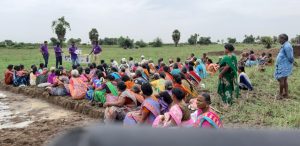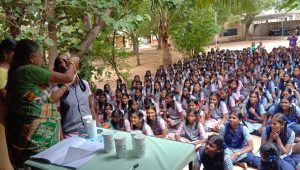Study Design
The DeWorm3 Study is a series of community cluster randomized controlled trials. It uses a community-wide drug administration approach to determine whether deworming both children and adults can begin to disrupt the soil-transmitted helminth (STH) transmission cycle. We selected sites across three countries — India, Malawi, and Benin — to conduct community cluster randomized trials comparing the school-based strategy to community-wide deworming.

Community-wide drug administration
Timiri, India/ Mr. Rajeshkumar Rajendiran

School-based strategy
Timiri, India/ Mr. Rajeshkumar Rajendiran
Each trial site study involves a population of over 80,000 people divided into 40 total clusters. Clusters are randomized to receive either the current WHO approach providing deworming medication to school-aged children, while other clusters receive community-wide deworming across all ages. This two-level approach will continue for three years. Once this treatment is complete, no deworming will occur for two years, after which the prevalence of STH infection at each site will be examined to assess success.
A number of implementation science studies will be conducted alongside the trials to address distinct and complementary questions that generate evidence of sustainable and scalable models for soil-transmitted helminth (STH) transmission interruption.
Read our trial protocols published in PLoS Neglected Tropical Diseases:
DeWorm3 Trial Protocol
Ásbjörnsdóttir et al. (2018)
DeWorm3 Implementation Science Protocol
Means et al. (2018)